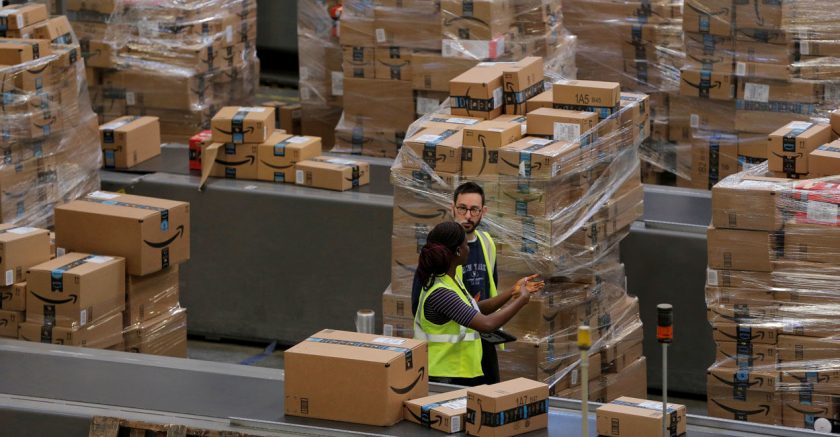Workers at an Amazon fulfillment center in South Carolina erupted in cheers and high fives when the news broke that Amazon is raising its minimum wage to $15 per hour.
Those cheers would have ceased, however, had the company then divided workers into two groups—those receiving pay increases and those receiving pink slips.
That would unfortunately be the reality for most low-wage workers across the U.S if Congress imposed a $15 national minimum wage.
Nevertheless, Amazon made its decision as a private company, and it is worthy celebrating. Here are three reasons why it’s great news for Amazon workers and for the U.S. economy as a whole:
1. Amazon’s move reflects a strong economy that benefits all Americans.
The fact that Amazon can pay all its workers at least $15 per hour shows that the economy is growing in ways that benefit all Americans—not just those earning below $15 per hour.
With the unemployment rate below 4 percent and more job openings available than there are people looking for jobs, the labor market is stronger than it’s been in decades. And businesses—small and large alike—are thriving on the back of the recent Tax Cuts and Jobs Act and the removal of unnecessary and harmful regulations.
Businesses are sharing that growth with workers through things like wage increases, bonuses, and new benefits such as paid family leave.
2. Higher wages means more money and more opportunity.
When workers take home more money, they can purchase more goods and services and save for their future. They can also invest in themselves through education and training.
In addition, higher wages can draw marginal workers—like teenagers and individuals with disabilities—into the labor force, giving them experience and opportunities they otherwise would have missed.
3. Higher wages reflect increased productivity.
The fact that Amazon can pay all its workers at least $15 per hour highlights the company’s use of technology and innovation to make workers more productive.
In part, Amazon has done this through automation—using robots to replace human workers. And there’s nothing wrong with that—robots still require humans to build, operate, and service them.
In the long run, companies can’t afford to pay workers more than the value they contribute to the company, so workers who receive pay increases should celebrate both their bigger paychecks and their greater value.
While Americans should celebrate Amazon’s higher wages, here are three reasons why they should worry about a higher federal minimum wage:
1. A low-wage job is better than no job.
Economists across the political spectrum agree that even small minimum wage increases lead to job losses.
A 2016 Heritage Foundation analysis found that more than doubling the federal minimum wage from $7.25 to $15 would cause 7 million workers to lose their jobs. While lower-income areas would be the hardest hit, even high-income areas would suffer.
A government-commissioned economic analysis of the impact of implementing a $15 minimum wage in one of the richest counties in America—Montgomery County, Maryland—found that it would cause one in every three low-wage workers to lose their jobs and would result in a $1.8 billion decline in net income for low-wage workers over the next five years.
That’s why even Alan Krueger, Princeton University economist and former chair of President Barack Obama’s economic advisers, noted that a $15 national minimum wage would “risk undesirable and unintended consequences,” and said that implementing a $15 minimum wage “strikes me as a risk not worth taking.”
2. Shutting the door to opportunity.
For most workers, minimum wage jobs are stepping stones, not careers. Low-wage jobs—regardless of whether washing dishes or ringing up groceries—give workers critical experience that they can’t get in a classroom. And that experience opens doors.
Those jobs also provide the opportunity for less-advantaged teenagers to earn money to attend college or vocational training that they otherwise couldn’t afford.
Moreover, there is dignity in work, and low-wage jobs allow individuals the opportunity to overcome hurdles—like disabilities, lack of English proficiency, or a criminal record—and provide for themselves.
On the flip side, artificially high minimum wages shut workers out of jobs and opportunities, leading them to believe they have no value to society and to give up on their dreams and goals.
Read the full story from The Daily Signal
Want more BFT? Leave us a voicemail on our page or follow us on Twitter @BFT_Podcast and Facebook @BluntForceTruthPodcast. We want to hear from you! There’s no better place to get the #BluntForceTruth.







